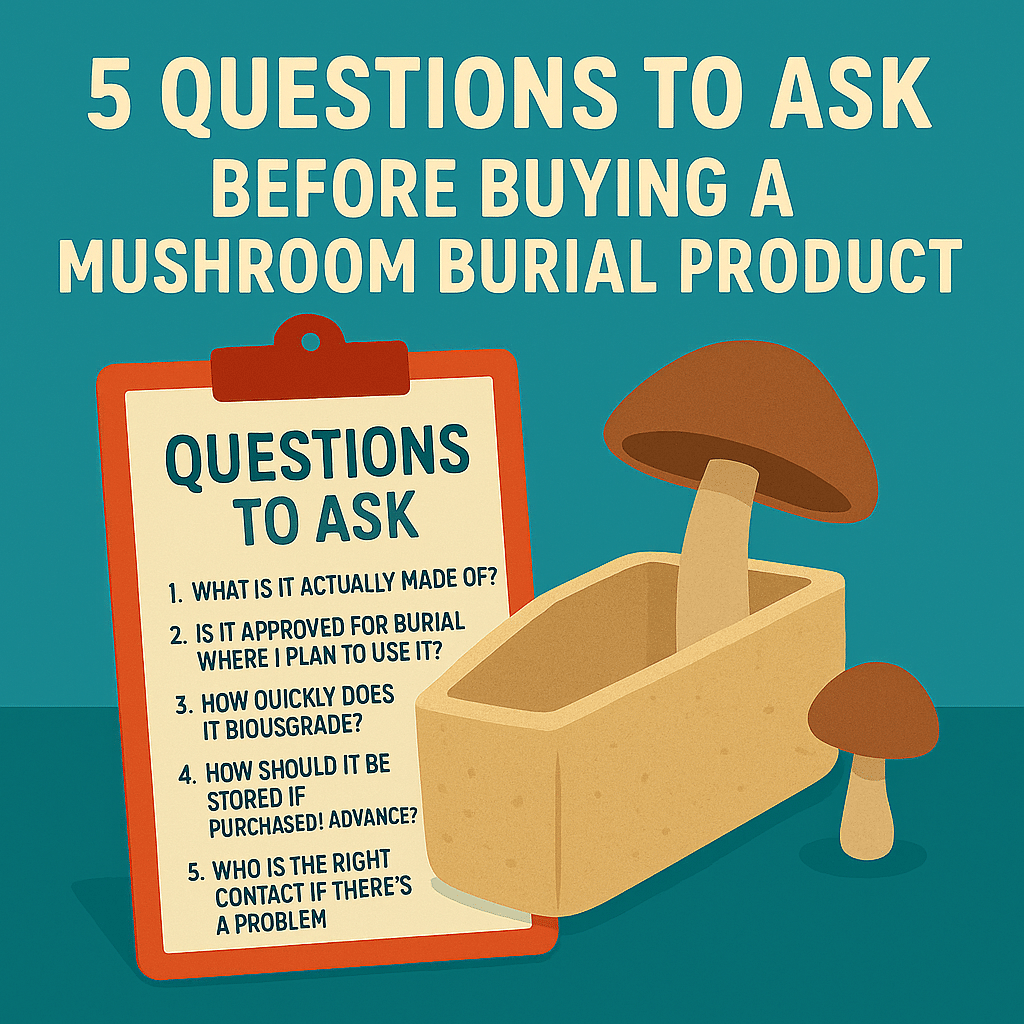Choosing a burial vessel made from mushrooms or mycelium is a beautiful step toward a greener, more intentional end-of-life plan. But just like any meaningful purchase, it helps to ask the right questions before you commit. Not all mushroom burial products are created the same, and what works in one setting might not work in another.
These five questions will help you shop smart, avoid surprises, and feel more confident about your decision.
1. What is it actually made of?
The term “mushroom burial product” can refer to a range of materials. Some products are made from 100 percent mycelium, the living root structure of fungi. Others use a biodegradable base like hemp or flax, with mushroom spores added for symbolic value. And some products are shaped with natural materials but contain resins, glues, or synthetic reinforcements.
Always ask for the material breakdown. If your goal is a truly sustainable burial, look for options that avoid plastic, varnish, and synthetic liners. Ask if it’s certified compostable or approved by green burial councils.
2. Is it approved for burial where I plan to use it?
This is a big one. Many mushroom-based burial products are designed for green or natural cemeteries. These spaces accept biodegradable caskets, avoid embalming, and do not require concrete vaults.
However, not every cemetery allows alternative burial methods. Traditional cemeteries may have restrictions based on local or state regulations. Before purchasing, contact the cemetery or funeral provider and ask:
-
Do you accept biodegradable coffins or urns?
-
Do you allow burial without a vault?
-
Have you worked with mushroom burial products before?
A little coordination up front can save you money and stress later.
3. How quickly does it biodegrade?
One of the key benefits of a mycelium coffin or urn is that it returns to the earth far faster than traditional materials. Many claim to decompose within 30 to 45 days under the right conditions. Compare that to pine wood (10 to 15 years) or metal coffins (which may never fully break down).
Still, decomposition depends on factors like:
-
Soil type
-
Moisture and temperature
-
Whether the body was embalmed
-
Local microbial activity
If you want the product to biodegrade naturally, you’ll need to skip embalming and choose a location that allows direct contact with the soil.
4. How should it be stored if purchased in advance?
Some mushroom burial products are shelf-stable and can be stored in a cool, dry place. Others may degrade over time or require special handling to maintain their structure. If you’re pre-purchasing for yourself or someone else, ask the seller:
-
Can I store this at home?
-
Does it have a shelf life?
-
Will it be shipped fresh or cured?
If you’re using a funeral home or burial provider, you may be able to coordinate shipment only when the product is needed.
5. Who is the right contact if there’s a problem?
Even with the best intentions and craftsmanship, these products are still relatively new. Delays, supply chain issues, or unexpected damage during shipping can happen.
Ask the vendor:
-
What’s your return or refund policy?
-
Do you offer customer support or coordination with funeral homes?
-
Can I speak with someone directly if I have a time-sensitive need?
Working with a responsive, knowledgeable team makes a difference, especially during an emotional time.
Bonus Tip: Ask for photos of actual products
Because mycelium burial products are grown, not mass produced, there can be natural variations in texture, color, and shape. These differences are a feature, not a flaw. Still, seeing photos of the product you’ll receive (or similar samples) helps set expectations and avoid misunderstandings.
If you have feedback, questions, or ideas for future articles or Information Hubs, please contact us. Your insights help us create valuable content.


